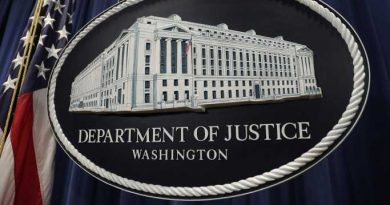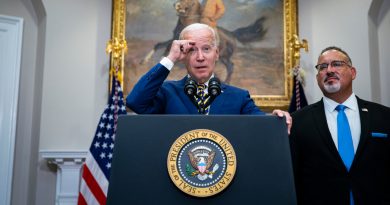Joe Biden Wants To Make Community College Free. Can Progressives Push Him Further?
DIXON, Illinois ― President Joe Biden’s administration is set to push to make community college tuition-free across the country, a potentially revolutionary policy that could nonetheless disappoint progressives who hope to persuade him to turn a campaign plan to make four-year public colleges free into a reality.
On Monday, first lady Jill Biden and Education Secretary Miguel Cardona traveled to Sauk Valley Community College here to extol the virtues of the nation’s community colleges as economic boosters and institutions open to all economic and social classes. It’s a familiar role for Jill Biden, a longtime professor at Northern Virginia Community College who has spent much of the past decade pushing to make community colleges free.
“Community colleges are our future,” Biden said, without ever directly mentioning her husband’s yet-to-be-formally-unveiled plan to make them tuition-free. (The president is expected to lay out his proposal, part of the broader American Families Plan, during a Wednesday address to Congress.)
There is relatively little intra-Democratic debate over free community college. Progressives and moderates have both embraced the idea, which has broad support in public surveys. More than a dozen states, including several controlled by Republicans, have made attending the two-year schools free over the past decade, and mounting evidence suggests the programs have enticed more low-income students to earn associate’s degrees or complete job-training programs that are often essential to economic survival in 21st-century America.
“We are reimagining our education system from pre-school to college,” Biden said, adding later: “We can’t continue to exclude some people from continuing their education just because they’re from the wrong income bracket.”
But there is some fear among progressives that the administration could use successful passage of free community college to avoid more controversial moves to make higher education more affordable.
“It’s fantastic that community colleges have won the lottery and have a tremendous advocate in the first lady,” said Melissa Byrne, a former staffer for Vermont Sen. Bernie Sanders’ presidential campaign who has pushed the White House to cancel student debt. “But that doesn’t mean we have to have a decade where we just have free community college, then move on to free four-year institutions.”
The White House declined to specify what would be in the plan rolled out this week, with an official promising only that it would “focus squarely on creating economic security for the middle class through investments in childcare, education, and other areas.”
This past week, Sanders and Rep. Pramila Jayapal (D-Wash.) introduced legislation to make public colleges and universities, along with historically Black colleges and universities and other schools focused on serving racial minorities, free for all families making less than $125,000 a year. The federal government would pick up 75% of the cost ― paid for with a tax on financial transactions that Sanders says would raise $2.2 trillion over the next decade ― with states picking up the remaining 25% of the tab.
The legislation closely tracks a plan then-candidate Biden rolled out not long after locking up the Democratic nomination, when he was courting supporters of Sanders and Massachusetts Sen. Elizabeth Warren. The idea would also almost certainly generate resistance.
Sanders pitched the idea of tuition-free college to Cardona during a call earlier this month, according to a Democratic aide. But while lobbying efforts have emerged to include progressive health care priorities in the American Families Plan, no similar effort has emerged to include free four-year colleges so far.
Instead, most progressive efforts on higher education since the beginning of Biden’s presidency have focused on convincing his administration of the political, legal and policy merits of a mass cancellation of billions of dollars of already-existing student debt. Warren and Senate Majority Leader Chuck Schumer (D-N.Y.) have led a push to convince Biden to cancel up to $50,000 of student debt per person.
The White House has directed Cardona to review the administration’s options. During the campaign, Biden supported canceling up to $10,000 of student debt per person ― but through congressional action, not by a unilateral presidential move.
Still, progressives are saying any action on student debt needs to be paired with efforts to make college cheaper now, in order to avoid the need for future mass cancellations.
“You can’t do one without the other. You can’t just cancel, and you can’t just make college free,” said an aide to a progressive Democratic senator who requested anonymity to discuss intraparty dynamics. “You’ll just end up in the same situation you are, with a matching debt crisis in a decade.”
But both doing mass debt forgiveness and pushing for tuition-free college would require a massive investment of political capital from Biden, particularly when compared to making community college tuition-free.
“There’s no political downside to doing community college,” said Lanae Erickson, the vice president for social policy at Third Way, a moderate Democratic think tank, noting community colleges tend to be popular with nearly every segment of the electorate.
Another Democratic operative noted free community college could put some House Republicans on the defensive. Many of the nation’s largest community colleges, including Miami-Dade College in Florida, the College of Southern Nevada in Las Vegas and Lone Star College in Houston, are located in areas with multiple swing-seat House districts.
Erickson noted Biden would likely also move to increase funding for Pell Grants to help low-income students attend college.
“There’s not an unlimited amount of federal higher education investment to go around,” she said. “It’s an easier lift.”
In a supplemental budget released earlier this month, Biden proposed a $400 increase to the maximum Pell Grant, bringing the top value of the yearly grant to nearly $7,000.
While both increased Pell Grants and free community college are political winners and potential policy game-changers, neither is likely to satisfy progressives who view Biden’s presidency as a once-in-generation opportunity to transition away from a debt-financed higher education system to once primarily funded by the government.
“This White House is really committed to educational equity,” Byrne said. “But we just need to make clear to them they don’t need to take baby steps.”
Biden is off to a strong start with young voters ― 59% of Americans aged 18-29 approved of his job performance in a Harvard Institute of Politics survey released this week. But Ben Wessel, the former executive director of NextGen America, which focuses on youth voter turnout, said not doing more on college affordability could be a risk.
“He’d piss off activists that he does not need to piss off,” Wessel said, “and he’d miss a chance to inspire young voters who otherwise might not be paying attention.”
Source: Read Full Article


